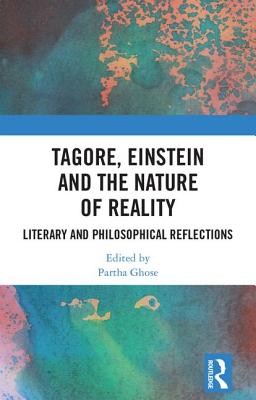
- We will send in 10–14 business days.
- Publisher: Routledge Chapman & Hall
- ISBN-10: 0815372116
- ISBN-13: 9780815372110
- Format: 14 x 21.6 x 1.6 cm, hardcover
- Language: English
- SAVE -10% with code: EXTRA
Tagore, Einstein and the Nature of Reality (e-book) (used book) | bookbook.eu
Reviews
Description
This volume consists of a selection of scholarly essays from literature, philosophy and history on the conception of reality as understood by Rabindranath Tagore and Albert Einstein.
The nature of reality has been a long-debated issue among scientists and philosophers. Tagore (1861-1941) met Einstein (1879-1955) at the latter's house in Kaputh, Germany on 14 July 1930 and had a long conversation on this issue. This conversation has been widely quoted and discussed by scientists, philosophers and scholars from the literary world. The important question that Tagore and Einstein discussed was whether the world is a unity dependent on humanity, or the world is a reality independent of the human factor. Einstein believed that reality is independent of the mind and the human factor. On the other hand, Tagore adopted the opposite view. Nevertheless, both Einstein and Tagore claimed to be realists - their conceptions of reality were obviously fundamentally different. Where does the difference lie? Can it be harmonized at a deeper level?
This volume brings together for the first time a gamut of views on this subject from eminent scholars. It presents some key reflections on reality, language, poetry, truth, science, personality, human sciences, virtue ethics, intelligibility and creativity. It will be useful to scholars and researchers of philosophy, literature, history and political studies, as also to those interested in Tagore.
EXTRA 10 % discount with code: EXTRA
The promotion ends in 14d.16:54:53
The discount code is valid when purchasing from 10 €. Discounts do not stack.
- Publisher: Routledge Chapman & Hall
- ISBN-10: 0815372116
- ISBN-13: 9780815372110
- Format: 14 x 21.6 x 1.6 cm, hardcover
- Language: English English
This volume consists of a selection of scholarly essays from literature, philosophy and history on the conception of reality as understood by Rabindranath Tagore and Albert Einstein.
The nature of reality has been a long-debated issue among scientists and philosophers. Tagore (1861-1941) met Einstein (1879-1955) at the latter's house in Kaputh, Germany on 14 July 1930 and had a long conversation on this issue. This conversation has been widely quoted and discussed by scientists, philosophers and scholars from the literary world. The important question that Tagore and Einstein discussed was whether the world is a unity dependent on humanity, or the world is a reality independent of the human factor. Einstein believed that reality is independent of the mind and the human factor. On the other hand, Tagore adopted the opposite view. Nevertheless, both Einstein and Tagore claimed to be realists - their conceptions of reality were obviously fundamentally different. Where does the difference lie? Can it be harmonized at a deeper level?
This volume brings together for the first time a gamut of views on this subject from eminent scholars. It presents some key reflections on reality, language, poetry, truth, science, personality, human sciences, virtue ethics, intelligibility and creativity. It will be useful to scholars and researchers of philosophy, literature, history and political studies, as also to those interested in Tagore.


Reviews